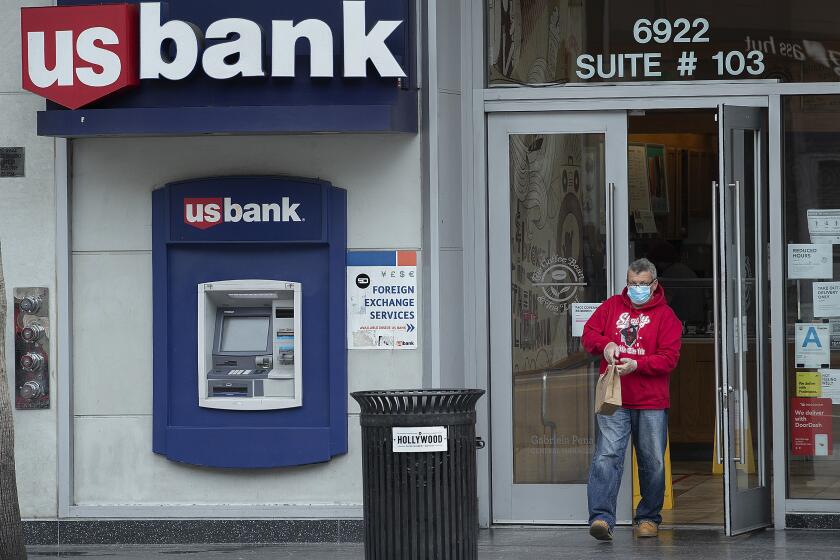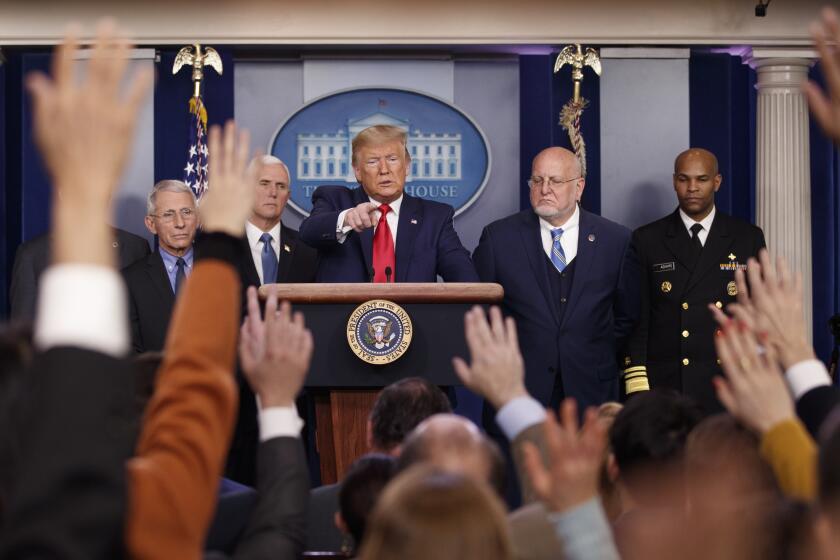What role should Trump play in the coronavirus crisis? Good presidents are comforters-in-chief
- Share via
Harry S. Truman woke up on his first morning as president 75 years ago today to a country in mourning.
Franklin Delano Roosevelt, the only man many Americans had ever known as president, was dead. World War II was won in Europe, but was not quite over. Vienna had just fallen to the Red Army, Prague was next, and Gen. George S. Patton was moving relentlessly to the east. Fighting continued in the Pacific. A fleet of American B29 Superfortresses pounded Tokyo, setting fires visible 100 miles away.
With preparations underway for Roosevelt’s body to return to the White House from Warm Springs, Ga., grieving Americans considered a question that has special relevance today:
What is the role of a president in times of testing and travails?
Roosevelt had been both president and pastor. His fireside chats were conversational and comforting. His talks were composed in what he called, in October 1933, “the simplest, clearest language of which I am capable.” He identified himself with the average citizen, opening a talk in 1940, when the world was aflame in war, saying: “As I sit here tonight with my own family...”
FDR never overpromised. “Today we have reason to believe that things are a little better than they were two months ago,” he said in May 1933. “Industry has picked up, railroads are carrying more freight, farm prices are better, but I am not going to indulge in issuing proclamations of overenthusiastic assurance. We cannot bally-ho ourselves back to prosperity. I am going to be honest at all times with the people of the country.”
The latest updates from our reporters in California and around the world
The U.S. Constitution makes the president commander-in-chief, but the founders never imagined that the president should be comforter-in-chief as well. On that sad morning in 1945, Truman found himself in the position of Abraham Lincoln’s successor, Andrew Johnson, in 1865, thrust by presidential death into the White House at the end of a debilitating military conflict without the gifts of his predecessor. Lincoln had held the hands of the wounded and the dying. FDR metaphorically had held the hand of a nation wounded by the Great Depression and then experiencing the death of 400,000 Americans in World War II.
Truman knew that he did not possess the gifts needed to be the nation’s comforter and consoler. He compensated with plain speaking and hard work. Indeed, on that first full day of his presidency, April 13, 1945, he worked feverishly, consulting with military leaders and meeting with congressional leaders on Capitol Hill. He met twice with Secretary of State Edward R. Stettinius Jr.
But America missed its pastor. And it wasn’t for another three decades that the pastoral arts truly became part of the presidential portfolio.
For all his national-purpose eloquence, John F. Kennedy lacked those gifts. So did Lyndon B. Johnson and, especially, Richard M. Nixon. But the pastoral presidency came roaring back after Watergate.
Taking office after Nixon’s resignation, Gerald R. Ford told the nation, “I am acutely aware that you have not elected me as your president by your ballots, and so I ask you to confirm me as your president with your prayers. And I hope that such prayers will also be the first of many.” Ford was succeeded by Jimmy Carter, then as now a Sunday School teacher, though his pastoral effort in his “malaise” speech of 1979 was a debacle.
Ronald Reagan may have been a virtual stranger to church services in his White House years, but he understood the power of a president’s “bully pulpit,” as Theodore Roosevelt put it. Reagan was never so effective as when, in 1986, he invoked the poet John Gillespie Magee Jr.’s lines in “High Flight” and spoke of the doomed Challenger astronauts as having “slipped the surly bonds of earth” to “touch the face of God.”
If only such important decisions weren’t in the hands of Trump, a president so obviously unprepared and ill-equipped to make them.
Bill Clinton, who as governor of Arkansas sang in the choir at Little Rock’s Immanuel Baptist Church, was once recruited for the priesthood. He demurred, but as a presidential candidate described his platform as a “covenant.” After the 1995 domestic-terrorist bombing of the federal building in Oklahoma City, he told an audience there: “Today our nation joins with you in grief. We mourn with you.”
In the days that followed the 9/11 terrorist attacks, George W. Bush summoned FDR’s call during his 1933 inauguration for “the warm courage of national unity.” At the National Day of Prayer and Remembrance service, Bush asked God to grant Americans patience and resolve. “We pray that He will comfort and console those who now walk in sorrow. We thank Him for each life we now must mourn, and the promise of a life to come.”
Fourteen years later, Barack Obama sang “Amazing Grace” at the end of his eulogy for the Rev. Clementa Pinckney, who was killed in the massacre at Mother Emanuel AME Church in Charleston, S.C. Obama opened his remarks by saying: “The Bible calls us to hope. To persevere and have faith in things not seen.”
Now America faces a challenge often compared to the twin challenges of the Depression and war that FDR confronted.
President Trump has said that being presidential is “boring.” Easter is over, Passover ends Thursday night. In this moment of deep crisis, the nation could use some presidential pastoral comfort.
David M. Shribman is executive editor emeritus of the Pittsburgh Post-Gazette.
More to Read
A cure for the common opinion
Get thought-provoking perspectives with our weekly newsletter.
You may occasionally receive promotional content from the Los Angeles Times.











